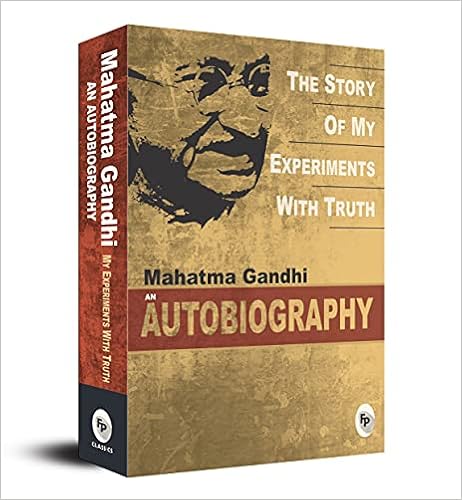Read more
Mahatma Gandhi Autobiography: The Story Of My Experiments With Truth
- Publisher : Fingerprint! Publishing; First edition (1 January 2009)
- Language : English
- Paperback : 448 pages
- ISBN-10 : 8172343116
- ISBN-13 : 978-8172343118
- Item Weight : 300 g
- Dimensions : 20 x 14 x 4 cm
Clearly, Gandhi never renounced the world; he was neither pacifist nor cult guru. Who was Gandhi? In the midst of resurging interest in the man who freed India, inspired the American Civil Rights Movement, and is revered, respected, and misunderstood all over the world, the time is proper to listen to Gandhi himself — in his own words, his own "confessions," his autobiography.
Gandhi made scrupulous truth-telling a religion and his Autobiography inevitably reminds one of other saints who have suffered and burned for their lapses. His simply narrated account of boyhood in Gujarat, marriage at age 13, legal studies in England, and growing desire for purity and reform has the force of a man extreme in all things. He details his gradual conversion to vegetarianism and ahimsa (non-violence) and the state of celibacy (brahmacharya, self-restraint) that became one of his more arduous spiritual trials. In the political realm he outlines the beginning of Satyagraha in South Africa and India, with accounts of the first Indian fasts and protests, his initial errors and misgivings, his jailings, and continued cordial dealings with the British overlords.
Gandhi was a fascinating, complex man, a brilliant leader and guide, a seeker of truth who died for his beliefs but had no use for martyrdom or sainthood. His story, the path to his vision of Satyagraha and human dignity, is a critical work of the twentieth century, and timeless in its courage and inspiration.
Identification with everything that lives is impossible without self-purification; without self-purification, the observance of the law of Ahimsa must remain an empty dream; God can never be realised by one who is not pure of heart. Self-purification, therefore, must remain purification in all walks of life. And purification being highly infectious, purification of oneself necessarily leads to the purification of one's surroundings.
But the path to self-purification is hard and steep. To attain perfect purity, one has to become absolutely passion-free in thought, speech and action; to rise above the opposing currents of love and hatred, attachment and repulsion. I know that I have not in me as yet the triple purity, in spite of constant ceaseless striving for it. That is why the world's praise fails to move me; indeed it very often stings me. To conquer the subtle passions seems to me far harder than the physical conquest of the world by the force of arms. Ever since my return to India, I have had experiences of the dormant passions lying hidden within me. The knowledge of them has made me feel humiliated though not defeated. The experiences and experiments have sustained me and given me great joy. But I know I still have before me a difficult path to traverse. I must reduce myself to zero. So long as a man does not of his own free will put himself last among his fellow creatures, there is no salvation for him. Ahimsa is the farthest limit of humility.
This unusual autobiography “The Story of My Experiments with Truth”, is a window to the workings of Mahatma Gandhi’s mind – a window to the emotions of his heart – a window to understanding what drove this seemingly ordinary man to the heights of being the father of a nation – India.
He did not aim to write an autobiography but rather share the experience of his various experiments with truth to arrive at what he perceived as Absolute Truth – the ideal of his struggle against racism, violence and colonialism.
size/448 Pages
off/Autobiography
